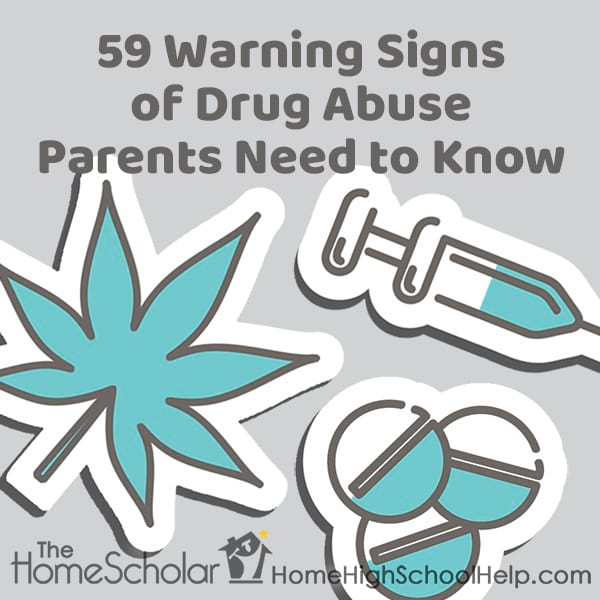
59 Warning Signs of Drug Abuse Parents Need to Know
Published on February 28, 2019 by LeeBinz

Most parents appreciate a little help and encouragement on their homeschooling journey. My free newsletter delivers this fresh each month. Click to get some yourself: The HomeScholar Record Newsletter.
Homeschoolers are not immune from the parenting woes the rest of society is facing. Our children live in the real world, no matter how much we love them and shelter them. And in the real world, drug overdoses are increasing, with deaths from drug use surging. As a nurse, I’ve seen wonderful parents suffer consequences when their head was in the sand, though. Wishful thinking and prayer can’t prevent bad choices – kids can still make their own decisions.
Let’s consider one of the most challenging aspects of parenting today. What symptoms should parents look for that indicate drug use?
- Finding drug paraphernalia (which may include pipes, rolling papers, needles, bottles, unusual containers, eye drops, butane lighters, smoking devices, cut up straws, mirrors, Ziploc bags, tin foil, weighing scales, balloons, aluminum foil wrappers, vials, capsules, etc.) or drug residue or remains (for example seeds, stems, powder, or strange-looking cigarettes)
- Accidents or injuries
- Acting secretive
- Appetite changes
- Avoiding eye contact
- Becoming defiant, uncooperative, hostile
- Being fearful or paranoid for no apparent reason
- Being unusually loud and obnoxious
- Bloodshot eyes
- Bruises, cuts, and sores (caused by falling, bumping into things, or scratching self)
- Burns on fingers or lips (from joints or burning)
- Changing friends or social circles
- Complaints from teachers, classmates, or others
- Constant scratching (a common sign of opiate use)
- Constipation
- Coordination problems
- Decreased interest in activities and hobbies
- Decreased motivation in school or activities
- Excessive thirst (“cottonmouth” is often a result of marijuana use)
- Extreme highs and lows
- Finding hidden stashes of drugs or alcohol or drug making paraphernalia
- Frequent illness
- Frequent mood swings or emotional instability
- Getting into conflicts or having trouble with schoolwork
- Headaches
- Increased illegal activity or behavior
- Isolating themselves from friends or family
- Lack of respect for authority
- Laughing for no apparent reason
- Lethargy or low energy
- Manipulative or deceitful behavior
- Memory problems
- Missing cash or other valuables from your home (which may be pawned for drugs)
- Missing medications, alcohol, cigarettes, etc.
- Missing school assignments or extracurricular activities
- Nausea and vomiting
- Newfound demand for privacy
- Nosebleeds (may occur from snorting or drugs like cocaine
- Periods of drowsiness followed by periods of high energy
- Pinpoint pupils (a common sign of opiate use)
- Poor academic performance
- Poor concentration
- Poor coordination
- Poor hygiene
- Runny nose
- Seizures (if no history of a seizure disorder)
- Shakes or tremors
- Sleep disturbances
- Slurred or rapid-fire speech
- Smelling like drugs, alcohol, or unusual odors
- Smelling strong incense or perfumes in their room (to hide the smell of drugs)
- Sudden weight loss or gain
- Sweating
- Teeth clenching
- Track marks on arms or legs from intravenous drug use
- Unexplained changes in attitude or personality
- Unexplained disappearances for significant periods of time
- Violating curfew and ignoring rules
- Wearing long sleeves even in the summer (to cover up track marks)
Having some symptoms does not mean your child is addicted to drugs. There can be circumstances beyond your teens control. Perhaps a friend has left some drug paraphernalia in a car, or they were loaned or purchased used equipment that had hidden drug paraphernalia in it.
Still, as parents, it would be negligent if we didn’t do our due diligence. So here is what you need to do.
- Understand what to look for using this list of symptoms.
- Observe your child intentionally, without discounting the possibility of drug use.
- Ask your child open-ended questions and start a conversation.
- Seek help if needed, starting with your pediatrician.
Even good homeschool parents can have a child that makes poor life choices. Don’t beat yourself up! Even perfect parents can’t guarantee that a child will always make good choices. Instead, starting now, open your eyes. Make changes if you identify a problem.


